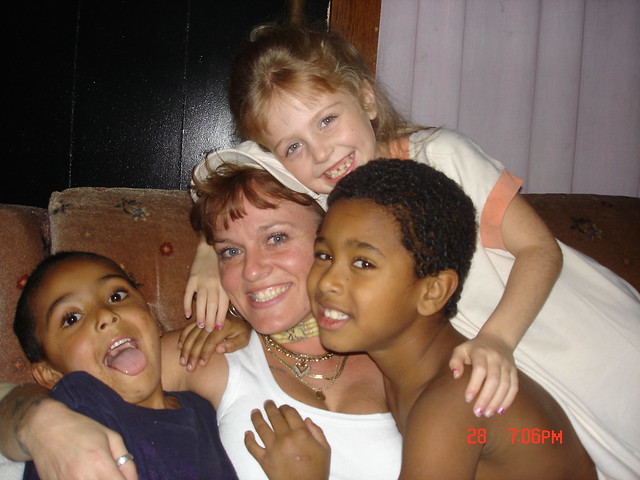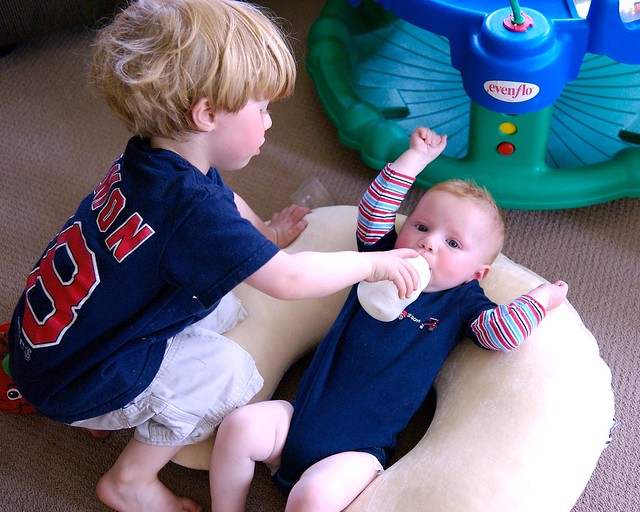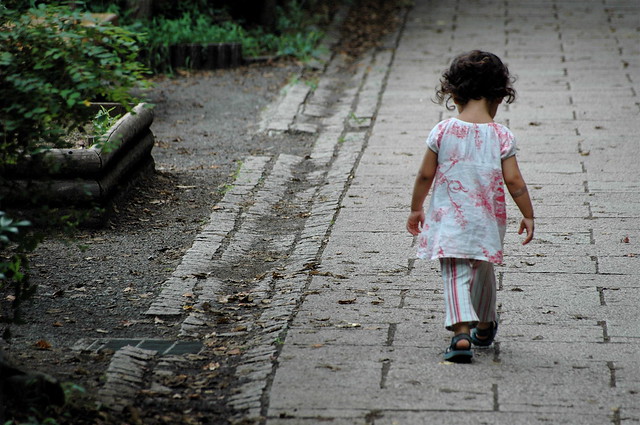Guest Post by Young Mom. Regular readers know that I believe that large families are as marred by sin and selfishness as any other size family, and that the more people involved the greater the harm that can be done. So I am thrilled that Young Mom agreed to share her ideas on ways that parents of large families can parent well. Even more than always, be kind with your comments. And enjoy!
I am the oldest of 11 children. I enjoyed many things about growing up in a full house; a lot of what you hear about big families is true! There is always someone to play with, you learn to work together with lots of other people, and you get lots of opportunities to learn about caring for children of all ages. Personally, I love children, and I would even love to have a fairly large family myself.
It’s also true that having many children means that each child won’t get as much individual attention. I think that this fact ended up being helpful in my family. When there is emotional dis-function or excessive control from parents, less attention can be a bit of a relief. My world would have been very different if my parents had stopped with 2 or 3 children. The pressure I was under while living at home was so great, I can only imagine how it would have intensified if my parents had not been forced to spread themselves a little thinner. So yes, my family had its issues. I don’t feel that those issues were rooted in the amount of children; however, those issues were played out within a large family.
I have 3 young children myself, and I’ve been thinking a lot about how I want to raise them. So when Rae asked me to do a post on what parents of large families can do to avoid some of the particular problems large families run into, I was interested. I can’t say I have a lot of experience in what to DO yet, but I do know some mistakes that the family I grew up in made that I will be avoiding at all costs, so I will share some of those.

1. Don’t tell your older children that “all their siblings are watching them” and the younger children’s actions are contingent on the behaviour of the older child. I had endless anxiety over my performance, and felt guilty over things that my siblings did! I felt responsible for every one’s behaviour and attitude as a child, and let me tell you it was exhausting! It may sound silly, but as a child that was my understanding of my role in the family.

2. Don’t demand perfection. It may be hard to keep expectations reasonable when you feel overwhelmed as a parent. But please remember that your kids are still learning. Never being able to fully please your parents is damaging, and for me it made me want to quit trying entirely. Comparing children to their siblings only makes them feel judged on the basis of performance levels. Give your children the gift of being good enough.
Recognize your children’s efforts. No they are not able to contribute as much as you can as an adult, and yes their standards may look a bit different from yours and their attitudes may not be as stellar as you’d prefer, but they are trying! Whether you believe it or not, your children want to please you! Be please-able! In a large family it can be easy to only recognize the really BIG things, try to see the little efforts of each child as well.

3. Respect your children. Realize that they are little people, with the same desires, emotions, struggles and challenges you have. They are just as fully a person as you are. Respect them and their feelings just as much as you would anyone else. As a child I often felt like my perspective was vetoed without consideration. In order to maintain control my parents often approached things with a formula and that meant an inability to listen to feedback. Listen to what your kids have to say, and don’t be afraid to apologize when you are wrong.

4. Please take care of yourself as a parent! As the parents of many children it is harder than ever to make the effort to take care of yourself. But I WISH my parents would have done this. I remember my mom being exhausted but refusing to get the rest she needed because she “had work to catch up on around the house”. I can recall months at a time where my mother never found the chance to leave the house. Often parents feel that by sacrificing everything they are truly being unselfish and caring for their children. I would argue that unless you are caring for yourself you are going to be incapable of fully caring for your children. When you are depleted, your children get the leftovers.

5. Don’t turn your older children into mini-parents. This is a big one, and the one I see parents of large families violate the most often. I see no problem with older siblings helping out with younger children. It can be fun and rewarding to help care for a little brother or sister. But please be careful that you don’t let it become full-time parenting. If your older child is responsible for dressing, feeding, teaching and watching a younger child, that is too much. Please remember that the older child is still just that, a child. They will do stupid things; they are not ready to be a parent. Please do not let them run a younger child’s life when they are too immature to run their own!
Situations where the older child has too much authority over and control of a younger sibling’s life can lead to very unhealthy situations including physical and sexual abuse.
Most particularly, NEVER give an older child the responsibility of disciplining siblings. Older children tend to have a hyper-sense of justice and want to please their parents, resulting in perfectionism. Now the younger children not only have their own parents to please, but myriads of older siblings’ standards and preferences to deal with. It is impossible to teach an older sibling how to discipline a younger sibling responsibly. You are the parent, do it yourself.

6. Don’t forget that you have younger children you can delegate chores too, they shouldn’t all end up on the older children’s to-do list. As the oldest child, I had a lengthy list of chores at an early age. The problem was that the list didn’t change, it was just added to. My mom at times felt overwhelmed at the prospect of teaching another child to do the same chore, it was easier to just let me take care of it. The result was that every chore I had at age 10 was still on my list when I was 17, plus all the additional chores that had been added as I matured. The responsibility was exhausting sometimes and I was always behind in my work because there was simply too much for me to try to keep up with.

7. Don’t make your kids responsible for your feelings. It’s easy to blame your kids for a bad day; after all they certainly contribute to the amount of work it takes to keep the family running! Please keep yourself from venting at your kids. It is unreasonable to expect children to bear the burden of their parents’ emotions. Yes, maybe you are feeling overwhelmed or unappreciated, but it is not your kids fault. Bad days happen for many reasons, and it’s OK to feel frustration, but be careful that you do not make your children feel guilty for existing and adding to your burden. Your children will have many needs, and by having many children you will have more needs than average to take care of! But having needs is not selfishness on their part.

8. Don’t forget that your children are individuals. The temptation with large families is to treat the entire group as a whole, forgetting the individuals that make up that group. Yes it may be more economical to have everyone take the same extra-curricular activity, but while piano lessons may be one child’s dream come true, don’t assume they will all feel the same way, and don’t make any child feel bad for having interests that lie elsewhere. Yes, one child may require more time in conversation, but that doesn’t mean they have a problem, maybe it’s just the way they relate. Another child may drag at chores, it may not be laziness, maybe it’s just personality. Give your kids the freedom to be who they are, even if it doesn’t fit your dreams, and even if it’s more inconvenient to have so many individuals. In the same way, watch out for sibling persecution. Peer pressure is one thing, making fun of a sibling or excluding them from interaction is so cruel, and it can be remembered for years. Try to be there to spot it and correct it, because the persecutors may not be fully aware of how their actions hurt their sibling.

9. Try to give attention to every child. This is related to recognizing them as individuals. Don’t expect every child to feel loved in the same way. Some may treasure gifts forever, others may forget about them the next day. Some may love having a quick chat; others may not be into talking so much. But in a large family, every child will value individual time, time with spent with their parent alone! Whether it’s reading a chapter of a book with Mom after everyone else was sent to bed, or going out to a fast food restaurant alone with Dad. It may seem like it is not worth the amount of effort, but taking the time to do something with each child individually and just drop everything and listen to them talk, is irreplaceable. Some of my best childhood memories are made up of those moments.

10. Be sure that each child has privacy and things of their own. You share a LOT in a large family, and in many ways its a great thing. But sometimes it can get exasperating when there are improper boundaries. Every child should have a few toys/possessions that only belong to them, that anyone else has to ask before touching. Most of the time, children in a large family do not get their own rooms, but try to give them a space of their own, whether it is a drawer that no one else can use, or a box where they can keep whatever they want. In the same way, respect boundaries as a child grows and matures. Make it possible for your children to have privacy for changing clothing and bathroom time. It may require some shift scheduling of the nighttime routines, but you’d be surprised how your teenage daughters might be willing to negotiate for 15 minutes uninterrupted in the bathroom to pluck their eyebrows and wash their face. If a child needs time alone, let them have it! You know you need time to recharge as a parent after your kids are in bed, well depending on the child, they might need quiet time as badly as you do!
Check out Permission to Live: Musings of a Young Mom for more of Young Mom’s posts!














